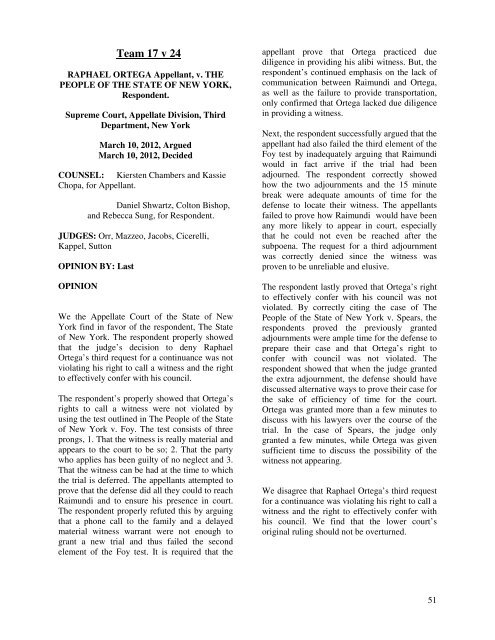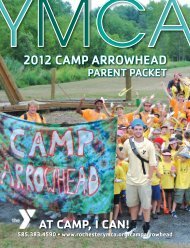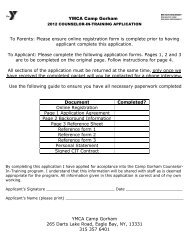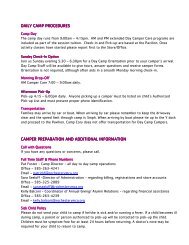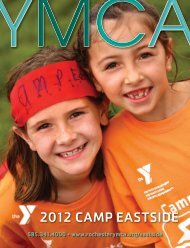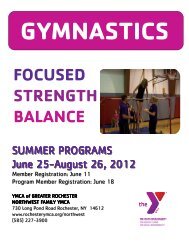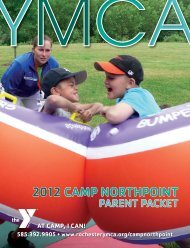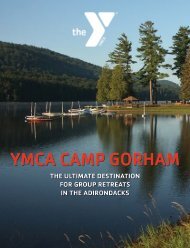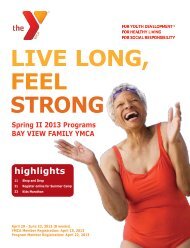2012 Conference Executive Record Report.pdf - YMCA of Greater ...
2012 Conference Executive Record Report.pdf - YMCA of Greater ...
2012 Conference Executive Record Report.pdf - YMCA of Greater ...
You also want an ePaper? Increase the reach of your titles
YUMPU automatically turns print PDFs into web optimized ePapers that Google loves.
Team 17 v 24<br />
RAPHAEL ORTEGA Appellant, v. THE<br />
PEOPLE OF THE STATE OF NEW YORK,<br />
Respondent.<br />
Supreme Court, Appellate Division, Third<br />
Department, New York<br />
March 10, <strong>2012</strong>, Argued<br />
March 10, <strong>2012</strong>, Decided<br />
COUNSEL: Kiersten Chambers and Kassie<br />
Chopa, for Appellant.<br />
Daniel Shwartz, Colton Bishop,<br />
and Rebecca Sung, for Respondent.<br />
JUDGES: Orr, Mazzeo, Jacobs, Cicerelli,<br />
Kappel, Sutton<br />
OPINION BY: Last<br />
OPINION<br />
We the Appellate Court <strong>of</strong> the State <strong>of</strong> New<br />
York find in favor <strong>of</strong> the respondent, The State<br />
<strong>of</strong> New York. The respondent properly showed<br />
that the judge’s decision to deny Raphael<br />
Ortega’s third request for a continuance was not<br />
violating his right to call a witness and the right<br />
to effectively confer with his council.<br />
The respondent’s properly showed that Ortega’s<br />
rights to call a witness were not violated by<br />
using the test outlined in The People <strong>of</strong> the State<br />
<strong>of</strong> New York v. Foy. The test consists <strong>of</strong> three<br />
prongs, 1. That the witness is really material and<br />
appears to the court to be so; 2. That the party<br />
who applies has been guilty <strong>of</strong> no neglect and 3.<br />
That the witness can be had at the time to which<br />
the trial is deferred. The appellants attempted to<br />
prove that the defense did all they could to reach<br />
Raimundi and to ensure his presence in court.<br />
The respondent properly refuted this by arguing<br />
that a phone call to the family and a delayed<br />
material witness warrant were not enough to<br />
grant a new trial and thus failed the second<br />
element <strong>of</strong> the Foy test. It is required that the<br />
appellant prove that Ortega practiced due<br />
diligence in providing his alibi witness. But, the<br />
respondent’s continued emphasis on the lack <strong>of</strong><br />
communication between Raimundi and Ortega,<br />
as well as the failure to provide transportation,<br />
only confirmed that Ortega lacked due diligence<br />
in providing a witness.<br />
Next, the respondent successfully argued that the<br />
appellant had also failed the third element <strong>of</strong> the<br />
Foy test by inadequately arguing that Raimundi<br />
would in fact arrive if the trial had been<br />
adjourned. The respondent correctly showed<br />
how the two adjournments and the 15 minute<br />
break were adequate amounts <strong>of</strong> time for the<br />
defense to locate their witness. The appellants<br />
failed to prove how Raimundi would have been<br />
any more likely to appear in court, especially<br />
that he could not even be reached after the<br />
subpoena. The request for a third adjournment<br />
was correctly denied since the witness was<br />
proven to be unreliable and elusive.<br />
The respondent lastly proved that Ortega’s right<br />
to effectively confer with his council was not<br />
violated. By correctly citing the case <strong>of</strong> The<br />
People <strong>of</strong> the State <strong>of</strong> New York v. Spears, the<br />
respondents proved the previously granted<br />
adjournments were ample time for the defense to<br />
prepare their case and that Ortega’s right to<br />
confer with council was not violated. The<br />
respondent showed that when the judge granted<br />
the extra adjournment, the defense should have<br />
discussed alternative ways to prove their case for<br />
the sake <strong>of</strong> efficiency <strong>of</strong> time for the court.<br />
Ortega was granted more than a few minutes to<br />
discuss with his lawyers over the course <strong>of</strong> the<br />
trial. In the case <strong>of</strong> Spears, the judge only<br />
granted a few minutes, while Ortega was given<br />
sufficient time to discuss the possibility <strong>of</strong> the<br />
witness not appearing.<br />
We disagree that Raphael Ortega’s third request<br />
for a continuance was violating his right to call a<br />
witness and the right to effectively confer with<br />
his council. We find that the lower court’s<br />
original ruling should not be overturned.<br />
51


